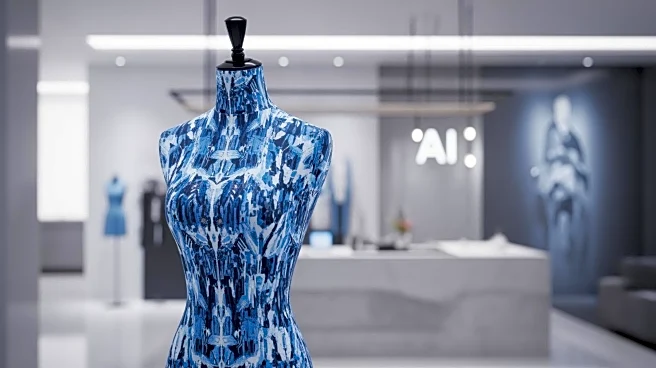What's Happening?
Small fashion brands are increasingly adopting artificial intelligence (AI) technologies to improve their business operations and creative processes. These brands, which typically generate less than $100
million in annual sales, are leveraging AI tools to streamline tasks such as inventory management, marketing, and product design. For instance, Bandit Running uses ChatGPT to analyze competitor locations and optimize retail strategies, while Pure Daily Care employs AI to refine product descriptions on Amazon, resulting in increased conversion rates. The integration of AI allows these brands to focus more on creative endeavors, such as designing products and crafting brand campaigns, while AI handles operational tasks.
Why It's Important?
The adoption of AI by small fashion brands is significant as it enables them to compete more effectively in a rapidly evolving industry. By automating routine tasks, these brands can allocate more resources to innovation and customer engagement, potentially leading to increased market share and brand recognition. Moreover, AI provides these companies with the ability to make data-driven decisions, enhancing their agility and responsiveness to market trends. As AI technology becomes more accessible, it offers small brands a chance to level the playing field with larger competitors, who have traditionally had more resources to invest in advanced technologies.
What's Next?
As small fashion brands continue to integrate AI into their operations, they may explore more advanced applications, such as AI-driven inventory management and merchandise planning. This could involve significant financial investments, prompting brands to carefully assess the cost-benefit ratio of outsourcing versus developing in-house capabilities. Additionally, as AI technology evolves, these brands will need to stay informed about new tools and applications to maintain their competitive edge. The ongoing integration of AI is likely to drive further innovation in the fashion industry, potentially leading to new business models and consumer experiences.
Beyond the Headlines
The use of AI in small fashion brands raises questions about the balance between technology and creativity. While AI can enhance efficiency, there is a concern that over-reliance on technology might stifle the unique creative processes that define these brands. Furthermore, the ethical implications of AI, such as data privacy and algorithmic bias, must be considered as brands increasingly rely on AI for decision-making. As the industry navigates these challenges, it will be crucial for brands to develop strategies that leverage AI while preserving their creative identity.









